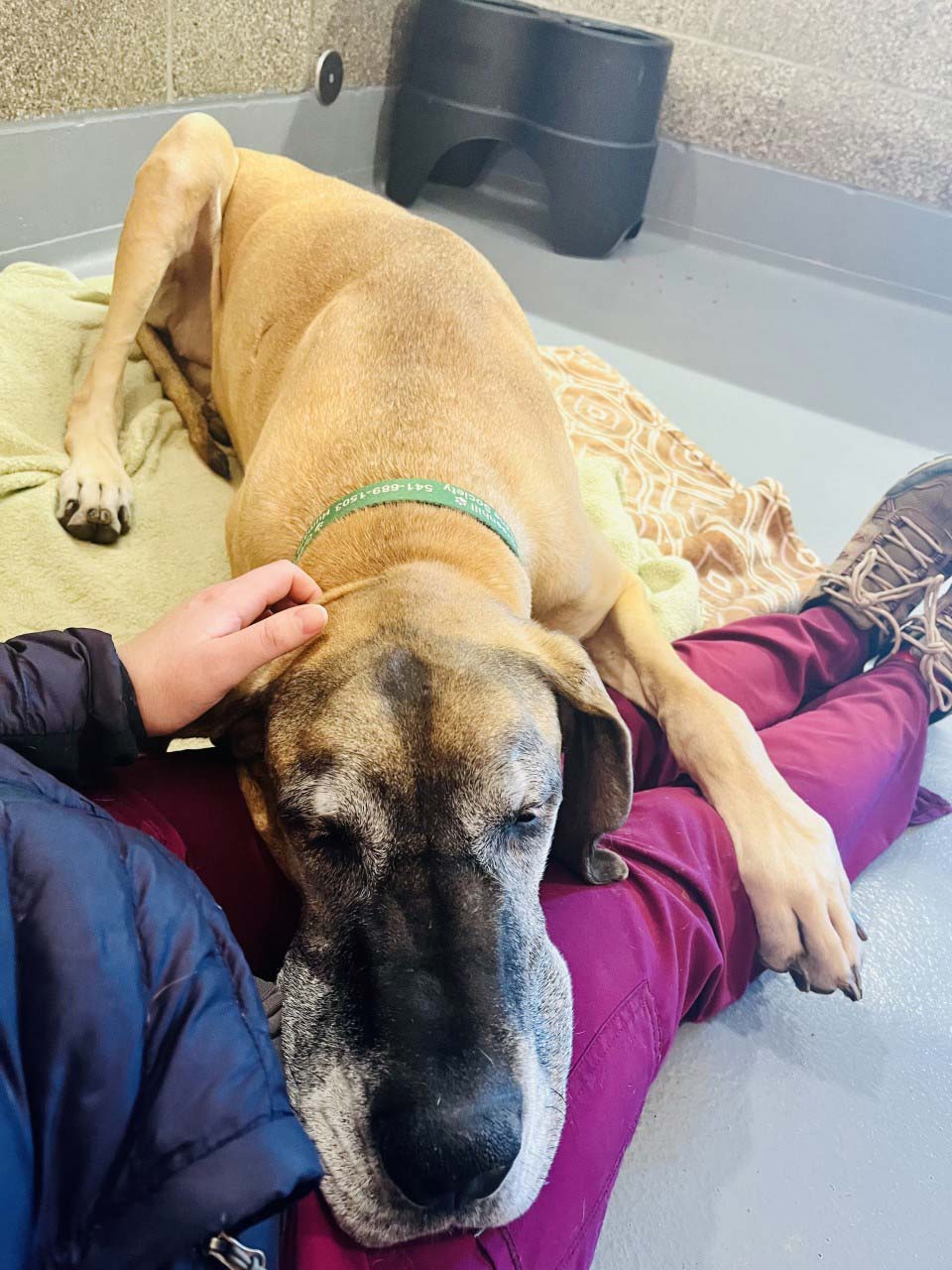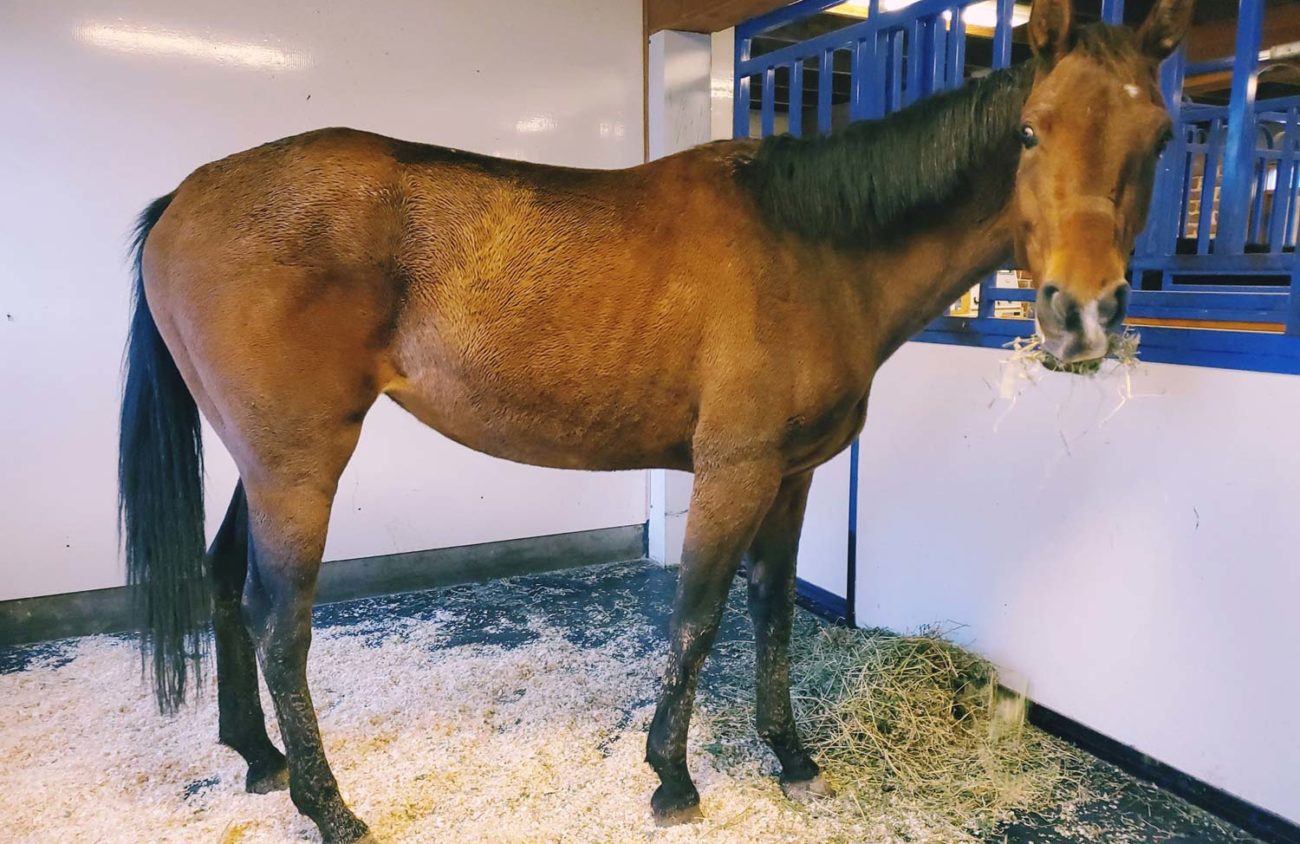PeaceHealth doctor Christy Horton pleaded guilty Nov. 1 in Eugene Municipal Court to one count of first degree animal neglect related to her three great Danes. Two remaining charges were dismissed by the city of Eugene as part of the plea deal.
Horton was charged with animal cruelty, but never convicted, 17 years ago in Washington state.
The city of Eugene took three great Danes and 11 horses from Horton, consulting local agencies and nonprofits to deliver care and secure placements for the animals. Lane County Animal Services accompanied Eugene Animal Services to the property to assist in the evaluation of horses, due to the county’s experience with larger animals.
“The condition of the three great Danes from the Eugene property was pretty sad,” says Sasha Elliott, director of operations at the Greenhill Humane Society. “They were found to have wounds and scars on their bodies that were consistent with potential past traumatic injury, there was feces caked on their feet, and just a general odor of feces permeating off of them. Their nails were thick and brittle and in some cases overgrown, sometimes twisting to the side.”
Police reports on the Eugene property describe portions of it as caked in dog feces and “an extreme hoarding situation” that required Hazmat crews to clean up.
All three dogs exhibit severe dental disease, under-socialization and separation anxiety, Elliott says.
Horton’s 11 horses fared equally poorly upon examination.
One horse had a body condition score of 4, one with a BCS of 3.5, five horses with a BCS of 3, one with a BCS of 2.5 and three with a BCS of 2, according to Sound Equine Options, a horse rescue nonprofit.
The BCS of a horse is a general indicator of its overall health. The optimal range for horse health is between four and six. Horses are scored from 1 (extremely thin) to nine (very overweight).
One horse had an untreated eye ulcer that looked to be three to five days old, according to the examination results posted by Sound Equine Options on its Facebook page.
“The city animal control contacted Oregon Humane Society for help on how to best rehome the horses,” says Kim Mossiman, co-founder and executive director at Sound Equine Options. “OHS told them to call us. We have partnered with OHS on neglect cases for years, so they know and trust us.”
She says, “There was an overall lack of care.”
Under Oregon law a person convicted of first degree animal neglect cannot own any animals of the same genus — in this case dogs — or any domestic animal for five years after conviction. Horton’s plea deal stipulates that she cannot own any animals for one year, a ruling that many animal advocates considered light, especially given Horton’s almost two decade-long history of alleged animal violations.
She has been placed on leave by PeaceHealth.
“While PeaceHealth does not comment on the private legal matters of its staff, Dr. Horton is currently on leave from Peace Harbor Medical Center,” a PeaceHealth spokesperson says. “We hold all caregivers to the same high standards for ensuring the safety of our patients.”
Even as advocates view the plea bargain as less than adequate, Horton still tearfully says she regrets agreeing to it. “I made a mistake in agreeing to a plea bargain and not taking it to court,” she says in a telephone interview.
She says she regrets allowing the horses to be taken, as well.
“I was trying to get along with everybody and to do things the right way,” Horton says. “In retrospect, I should’ve removed all the horses to where they had no access to them and nobody could’ve ever found them, and I didn’t do that. I was trying to play by the rules, and it was a very bad mistake.”
After a brief silence, the doctor added: “I should probably change that. Instead of ‘I should’ve,’ I could have. Let’s change it to ‘I could’ve moved the horses some place where nobody could’ve found them.’”
Horton’s story is more than a one-off act of negligence, and instead shows repeat violations with an overall lack of consequences. Legal handling of animal neglect and cruelty varies state to state and county to county, creating a situation ripe for repeat offenses.
In Lane County, animal neglect is often treated as a code violation rather than a criminal offense, which has been criticized as leading to an overall lack of enforcement. “You have to be willing to make them criminal charges, and not just code violations, because a code violation is not going to stop anybody,” Mossiman says.
Horton’s neglect story started 17 years ago in King County, Washington.
In July 2005, Washington state filed two criminal complaints against Horton, both for 2nd degree animal cruelty. The state issued a hearing notice on July 29, 2005, but Horton failed to appear at the courthouse on the scheduled date.
She was issued a warrant for failure to appear in August of the same year, which expired in September 2008 due to the state’s statute of limitations. The state reissued the warrant twice more in 2012 and 2015, but it expired both times. Finally, the state recalled the warrant in 2016, closing the books on Horton’s charges.
Horton never went to court in Washington on the charges.
Horton got her Oregon medical license as Christie A. Horton in May 2004, and after a stint at Mid-Columbia Medical Center in the Dalles went to Peace Harbor Medical Center in Florence.

In November 2014, a neighbor filed a complaint with Lane County regarding Horton’s dogs. At the time, she had five great Danes on her Mapleton property, which the county’s Nov. 20, 2014, complaint response said were “running through the neighborhood” and “acting in an aggressive manner towards the complainant and her black Labrador.”
According to the same letter, the county had received two complaints about Horton’s dogs acting in a “similar manner” in February 2013 and again in May 2014. Horton was issued a warning.
Mapleton neighbors Vince and Amanda Hendricks-Davis documented emaciated and bleeding cows on Horton’s property, along with videos of her great Danes attacking a defenseless tan and white cow, in a Facebook post from May 3, 2017.
The neighbors later added a photo of a dead cow lying in the middle of the field with the same color markings, believed to be the same animal that was being attacked in the earlier-recorded video.
The Hendricks-Davis household filed complaints with Lane County on May 6, 2017, detailing the events of May 3 and the subsequent death of their neighbor’s cow.
On the second page of the complaint, Amanda Hendricks-Davis wrote: “When I got to my neighbor’s house, I could see three great Danes tugging and pulling on various parts of the cow, who lay in the mud, still alive but seriously fatigued. I then pulled out my camera and started recording.”
The Hendricks-Davis household preferred not to comment, but provided documentation backing up the allegations they posted.
The county says that it had two contacts relating to Horton in 2017, one of which resulted in the surrender of a dog.
In the wake of Horton’s recent guilty plea, several individuals in the equestrian community have spoken out. Michigan real estate agent and horse breeder Dawn Spencer is among them.
Spencer, who sold Horton a young warmblood horse named Rhapsody in 2021, remains outraged. Rhapsody was one of the 11 horses taken from Horton in late October, and had a BCS of 2 at the time of her rescue. “It infuriates me,” Spencer says. “Seriously? You can torture animals and get one year without them?”
Spencer dealt with selling Rhapsody to Horton as she would’ve any other client in her eight years of breeding horses. She spoke with Horton on the phone, searched the internet, and found nothing more than what seemed a perfectly suitable buyer.
“I’ve been in real estate for 30 years, so I know how to dig,” Spencer says. “But Christy had a very public profile as a breeder, and as someone in the horse business. She was very vocal and supportive and even if you didn’t know her, you knew her because she was on the forums, she was on the breeder sites, always having conversation with everybody.”
Spencer says that while responsible breeders do their homework, abuse and neglect allegations are often kept quiet in the horse business, perpetuating the cycle of animal cruelty.
Money, she says, is a reason for this.
“If it’s your primary source of income, you’re hanging on by a thread,” Spencer says. “And if you start burning bridges, if you start having the reputation as someone who’s been the one that went public, you’re going to lose business.”
To this point, seven of the 11 horses have been placed in new homes. The city decided to honor a sale contract on one other horse which allows it to be returned to its breeder, while three remain at the rescue.
The three great Danes remain at Greenhill Humane Society. According to Ashbridge, Lane County Animal Services will be following up on reports of a great Dane being sighted on Horton’s Mapleton property.
To donate to the care of the horses, go to GiveGuide.org/nonprofits/sound-equine-options. To find out more about adopting one of the three remaining horses email adoption@soundequineoptions.org. To contribute to Greenhill’s care of the great Danes, go to Green-hill.org
Below are links to the plea deal on record with the Eugene Municipal Court and the Eugene Police Department’s incident report describing the condition of the home and yard the dogs were living in.
Help keep truly independent
local news alive!
As the year wraps up, we’re reminded — again — that independent local news doesn’t just magically appear. It exists because this community insists on having a watchdog, a megaphone and occasionally a thorn in someone’s side.
Over the past two years, you helped us regroup and get back to doing what we do best: reporting with heart, backbone, and zero corporate nonsense.
If you want to keep Eugene Weekly free and fearless… this is the moment.
